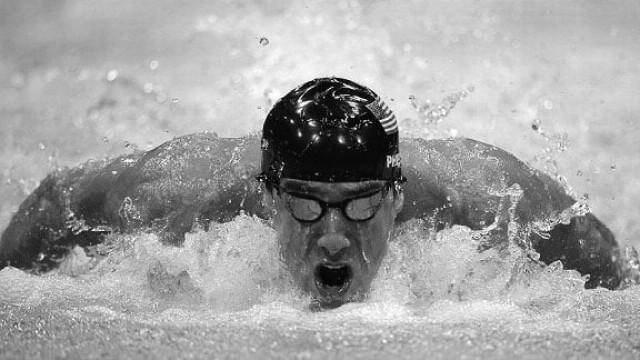Hall of fame: Michael Phelps – The Baltimore Bullet
He broke three world records in 2003 World Championship in addition to winning four golds and two silvers.

It was customary for Phelps to leave people in awe of his incredible talent, and claiming eight golds which justified his nickname, The Baltimore Bullet. PHOTO: AFP
The 100m butterfly at the 2008 Beijing Olympics is as close as it gets to a photo finish in the chlorinated world. Mark Spitz’s world record for seven Olympic gold medals has been equalled by luck, or some may call it, a stroke of ‘the inevitable’. An angered Milorad Covic was one-hundredth of a second short of the winning touch and many protests and video reviews upheld the decision to hand him the silver medal.
“It was just too close to see,” admitted a victorious Michael Phelps, the most decorated athlete in the history of the Olympic Games. Phelps was just one win away to break the great Spitz’s record at the 4x100m medley relay, and his team did not let him down. It was customary for Phelps to leave people in awe of his incredible talent, and claiming eight golds justified his nickname, The Baltimore Bullet.
The American always felt that pushing the boundaries and challenging what was termed ‘impossible’ was his duty. “Many people said that it [breaking Spitz’s record] can’t happen. I can assure you, nothing is impossible,” said the six-foot-four machine, giving a huge blow to his critics who believed Phelps’ six golds in the 2004 Olympics was the cap to his achievements.

As a seven-year-old, Phelps, who entered the pool after watching his sisters become professional swimmers, was afraid to put his face in the water. But resistance to the fear made him stronger and the first stroke he mastered was the backstroke; how convenient. Young Phelps’ talent was spotted by coach Bob Bowman and soon after, he broke his first record in the Junior Nationals in the 200m butterfly category.
A career filled with record-breaking appearances in the pool, Phelps was selected to compete for the US in the 2000 Sydney Olympics, making him the youngest ever to make an appearance there. The new kid on the block was getting the attention of swimming greats like Michael Thorpe, who himself felt he needed to push harder in training to compete with Phelps.
The ‘Half-Man Half-Fish’, as quoted by his Chinese fans, stepped up his act in the 2003 World Championship, winning four golds, two silvers and breaking three world records. For most swimmers, this would have been the highlight of their careers, but for Phelps, it was the beginning of an era that saw him break 39 world records.
The 2004 Summer Olympics in Athens was where Phelps made his mark. The Baltimore Bullet won six gold and two bronze medals, the second most dominant performance in the history after Spitz’z 1972 showcase in Munich. In the event which many were calling ‘The Race of the Century’, Phelps finished in third place behind Ian Thorpe and Pieter van den Hoogenband in the 200m freestyle. This finish ended his chances of equalling Spitzs’ record, but Phelps quickly shrugged off any signs of disappointment, “How can I be disappointed? I swam in a field with the two fastest freestylers of all time.”
The 2008 Beijing Olympics, which was considered the greatest individual performance in Olympic history, was where the American truly showcased his greatness by finally eclipsing the record he had his sights on. In what is called ‘The Great Haul of China’, Phelps propelled himself with 11 other remarkable individuals to become the record holder for the most golds (eight) in the event’s history. And to make his mark even brighter, he also broke seven world records during this.
“I am really proud of him, not just because he won eight golds. Rather, it’s how much he has grown up and matured into a great human being,” said Phelps’ idol, Ian Thorpe, on the American’s success.
After the competition, the question of whether Phelps was ‘too good to be true’ was raised, and was confronted by the media about taking performance enhancing drugs. A swift response by the Bullet was all it took to keep the critics under him as he cleared the nine tests for the Olympics and volunteered in a project run by the US Anti-Doping Agency.
At the London Olympics in 2012, Phelps further raised the bar having already been branded as the world’s greatest swimmer, and to many, the world’s greatest Olympian. Four golds and six silvers stretched his Olympic tally to 22 medals, 18 of them being gold.
No one in history has been as consistent as the young man from Baltimore. Having the expectations of his entire nation and the blessings of former greats, Phelps never caved in to pressure, always keeping himself ahead of the pack. The consistency dented the confidence of his competitors as there is absolutely no one who could even be a worthy challenger.
While there is always a debate in other sports on who is the greatest ever, there is no question in the world of swimming. Phelps will always be known as the most dominant man to ever to take a dive from the starting block. Now at the age of 28, Phelps has made a comeback from retirement and has set his sights on the 2016 Rio Olympics. And there is no doubt which man the cameras will be focused on as the legend of the Baltimore Bullet looks to begin a new chapter.
For the complete Hall of Fame series, log on to www.tribune.com.pk/halloffame/ (http://www.tribune.com.
Published in The Express Tribune, May 30th, 2014.
Like Sports on Facebook, follow @ETribuneSports on Twitter to stay informed and join in the conversation.



















COMMENTS
Comments are moderated and generally will be posted if they are on-topic and not abusive.
For more information, please see our Comments FAQ